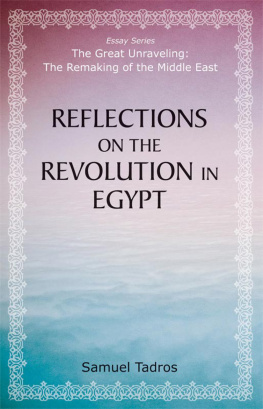Zeinab Abul-Magd - Militarizing the Nation: The Army, Business, and Revolution in Egypt
Here you can read online Zeinab Abul-Magd - Militarizing the Nation: The Army, Business, and Revolution in Egypt full text of the book (entire story) in english for free. Download pdf and epub, get meaning, cover and reviews about this ebook. year: 2017, publisher: Columbia University Press, genre: Politics. Description of the work, (preface) as well as reviews are available. Best literature library LitArk.com created for fans of good reading and offers a wide selection of genres:
Romance novel
Science fiction
Adventure
Detective
Science
History
Home and family
Prose
Art
Politics
Computer
Non-fiction
Religion
Business
Children
Humor
Choose a favorite category and find really read worthwhile books. Enjoy immersion in the world of imagination, feel the emotions of the characters or learn something new for yourself, make an fascinating discovery.

- Book:Militarizing the Nation: The Army, Business, and Revolution in Egypt
- Author:
- Publisher:Columbia University Press
- Genre:
- Year:2017
- Rating:5 / 5
- Favourites:Add to favourites
- Your mark:
- 100
- 1
- 2
- 3
- 4
- 5
Militarizing the Nation: The Army, Business, and Revolution in Egypt: summary, description and annotation
We offer to read an annotation, description, summary or preface (depends on what the author of the book "Militarizing the Nation: The Army, Business, and Revolution in Egypt" wrote himself). If you haven't found the necessary information about the book — write in the comments, we will try to find it.
Militarizing the Nation: The Army, Business, and Revolution in Egypt — read online for free the complete book (whole text) full work
Below is the text of the book, divided by pages. System saving the place of the last page read, allows you to conveniently read the book "Militarizing the Nation: The Army, Business, and Revolution in Egypt" online for free, without having to search again every time where you left off. Put a bookmark, and you can go to the page where you finished reading at any time.
Font size:
Interval:
Bookmark:
Militarizing the Nation
Militarizing the Nation
The Army, Business, and Revolution in Egypt
Zeinab Abul-Magd

Columbia University Press
New York
Columbia University Press
Publishers Since 1893
New York Chichester, West Sussex
cup.columbia.edu
Copyright 2017 Columbia University Press
All rights reserved
Library of Congress Cataloging-in-Publication Data
Names: Abul-Magd, Zeinab, 1976- author.
Title: Militarizing the nation : the army, business, and revolution in Egypt / Zeinab Abul-Magd.
Description: New York : Columbia University Press, 2016. | Includes bibliographical references and index.
Identifiers: LCCN 2016032821 | ISBN 9780231170628 (cloth : alk. paper) | ISBN 9780231542807 (e-book)
Subjects: LCSH: EgyptArmed ForcesPolitical activity. | EgyptPolitics and government20th century. | EgyptPolitics and government21st century. | EgyptEconomic conditions1952
Classification: LCC DT107.827 .A29 2016 | DDC 962.05dc23
LC record available at https://lccn.loc.gov/2016032821
A Columbia University Press E-book.
CUP would be pleased to hear about your reading experience with this e-book at cup-ebook@columbia.edu.
Cover Design: Rebecca Lown
Cover Image: AP Photo/Bill Foley
Contents
| ACA | Administrative Control Authority |
| AFLPO | Armed Forces Land Projects Organization |
| AOI | Arab Organization for Industrialization |
| ASA | Accountability State Authority |
| ASU | Arab Socialist Union |
| CSF | Central Security Forces |
| EAAF | Engineering Authority of the Armed Forces |
| FMF | Foreign Military Finance |
| FMS | Foreign Military Sales program |
| GAO | U.S. Governmental Accountability Office |
| MISO | Maritime Industries and Services Organization |
| MoD | Ministry of Defense |
| MoMP | Ministry of Military Production |
| MTS | Maritime Transport Sector |
| NDP | National Democratic Party |
| NSPO | National Service Projects Organization |
| SCAF | Supreme Council of Armed Forces |
| VO | Volunteer Organization |
Defense of society is tied up with war by the fact that... it is thought of in terms of an internal war against the dangers arising from the social body itself.
Michel Foucault, Security, Territory, and Population
Upon the graduation of new cadets in the summer of 2015, the director of the Egyptian war college proudly asserted that these young officers were the countrys future leaders... the ministers, governors, ambassadors, presidents, and managers.
In Egypts postcolonial history, the army saved the nation and served as its faithful guardian three times. The first was six decades ago, in 1952, when a group of young officers kicked out the British colonizer, deposed the monarch, and established a liberated republic. The second took place more recently, in 2011, when the armed forces decided to take the side of mass protests to overthrow an autocratic president, an ex-general himself who oppressively ruled the country for thirty years. The third was two years later, in 2013, when the armed forces again sided with protesting masses to overthrow an Islamist regime. But saving the nation was inseparable from militarizing it. Each time, the saviors assumed full power over the state and amassed immense economic privileges. This book follows how Egypts semiautonomous military institution has been visibly, or often invisibly, hegemonizing the countrys politics and economy throughout the past six decades. It traces the genealogies of military penetration into the urban spaces of all social classes of the population toward their full subjugation. It reveals how the officers in recent history deployed neoliberal means both to make business profits and to establish constant surveillance and omnipotent control over docile or rebellious masses. While propagating nationalistic rhetoric about guarding it, the Egyptian army has militarized the nation for long decades in the past and diligently continues to do so in the present.
Uniquely in its regional context, the Egyptian Army adapted to and benefited from crucial moments of change and survived old and new waves of revolutionary shifts in the country. It weathered fundamental moments of transition to socialism in the 1960s, market consumerism in the 1980s, and neoliberalism from the 1990s onward, while successfully enhancing its political supremacy and expanding a mammoth business empire. Recently it has survived hard times during two popular uprisings, retained full power, and increased its wealth. While adjusting to these difficult shifts, the officers have successfully turned the urban milieus of the population into an ever-expanded military camp: into sites of their permanent armed presence, continuous gaze, and control of everyday life. The military institutions business enterprises tapped into consumerist realms of rich and poor citizens alike, for both unaccountable profit and optimized social command. In the meantime, military bureaucrats securitized local urbanities to watch over the subordinated masses during times of peace or rebellious turmoil.
After the sweeping wave of the Arab Spring uprisings that erupted in 2011, the Egyptian Army stood among a few Arab militaries that not only remained intact but also succeeded in restoring command over its crumbling state. Military regimes and military-backed autocrats were born across the Middle East ever since its states gained independence from European colonialism in the mid-twentieth century. Tens of military coups dtat took place in the region and gave birth to officer-dominated regimes in postcolonial Arab states such as Syria, Libya, Iraq, Algeria, Tunisia, Yemen, and Egypt. These authoritarian regimes lasted for decades, until many of them finally collapsed under mass unrest in 2011. This wave led not only to overthrowing old military dictators such as Muammar al-Qadhafi of Libya or Ali Abdullah Saleh of Yemen, but also to dismantling many of their military institutions. Next door to Egypt in Syria, the son of a military dictator who inherited his fathers security state, Bashar al-Assad, has not yet been deposed, but his army has been similarly severely fractured. In Egypt, however, the aging military autocrat, Hosni Mubarak, was overthrown, but his army was kept fully intact and managed to shortly reinstate the military regime anew amid cheering masses. This book follows the historical roots of the Egyptian Armys political and economic might and how it survived the Arab Spring to restore absolute dominance.
When President Abdel Fattah al-Sisi swept elections in the summer of 2014, he was the fourth officer to take off his uniform and rule Egypt since its independence. Before him, Gamal Abdel Nasser (r. 19541970), Anwar Sadat (r. 19701981), and Mubarak (r. 19812011) were all ex-officers who uninterruptedly controlled the country through always obtaining landslide victories at ballot boxes. After Mubarak was deposed, the Supreme Council of Armed Forces (SCAF) ruled the country for a year and a half until it delivered authority to a civilian, Islamist president. Eventually al-Sisi returned the presidential seat to his institution after its loss for a brief one year in six decades.
During these long decades, the army has militarized everyday life of its subjugated and manipulated citizens across social classes. It has baked them subsidized bread, built affordable apartments, opened wedding halls, constructed football stadiums, and sold all sorts of consumer goods. The banners of military-owned expansive farms, manufacturing conglomerates, or construction companies are visibly installed atop their supermarkets, large shopping malls, toll highways, bridges, luxury hotels, summer resorts, and even parking lots. Moreover, retired generals have taken charge of state authorities and public-sector companies that provide citizens with basic services from water and sewerage, transportation, and road maintenance to telephone lines and the Internet. Above all this, the military has penetrated into the daily life of every family through compulsory conscription of male youths for a period between one and three years. A young man cannot travel, get a job, or even get married without finishing his military service first. In the meantime, the army produces popular songs about heroic officers, makes documentaries about brave soldiers, opens museums displaying great battles from pharaonic to modern times, and distributes charitable items to the poor in big festivities celebrating its sacrifices for the nation.
Next pageFont size:
Interval:
Bookmark:
Similar books «Militarizing the Nation: The Army, Business, and Revolution in Egypt»
Look at similar books to Militarizing the Nation: The Army, Business, and Revolution in Egypt. We have selected literature similar in name and meaning in the hope of providing readers with more options to find new, interesting, not yet read works.
Discussion, reviews of the book Militarizing the Nation: The Army, Business, and Revolution in Egypt and just readers' own opinions. Leave your comments, write what you think about the work, its meaning or the main characters. Specify what exactly you liked and what you didn't like, and why you think so.










